hash_ops.h File Reference
Hash operations header file. More...
#include "global.h"#include <db.h>

Go to the source code of this file.
Data Structures | |
| struct | hash_s |
| The abstract hash type. More... | |
Defines | |
| #define | HASH_TEMPORARY |
Only a temporary hash; not available in gdbm. | |
| #define | HASH_REMEMBER_FILENAME (0x40000000) |
| This flag tells hsh__new() to remember the filename, for later cleaning-up. | |
Typedefs | |
| typedef struct hash_s * | hash_t |
| A convenience type. | |
Functions | |
| int | hsh__new (char *wcfile, char *name, int gdbm_mode, hash_t *hash) |
| Create a new hash for wcfile with the given name. | |
|
| |
| #define | HASH__LIST_MAX (32) |
| Number of slots reserved. | |
| int | hsh__insert_pointer (hash_t hash, datum key, void *value) |
| For short-time storage (single program run): Insert the pointer value into the hash at key. | |
| int | hsh__list_get (hash_t hash, datum current_key, datum *next_key, struct estat **arr[], int *found) |
| Get an list of found entries from hash addressed by current_key into the (statically allocated) arr. | |
| int | hsh__store_charp (hash_t db, char *key, char *value) |
| Store character strings in the hash table. | |
| int | hsh__store (hash_t db, datum key, datum value) |
| Store some value in the hash table. | |
| int | hsh__fetch (hash_t db, datum key, datum *value) |
| Read value associated with some key in db. | |
| int | hsh__first (hash_t db, datum *key) |
| Find first key. | |
| int | hsh__next (hash_t db, datum *key, const datum *oldkey) |
| Find next key. | |
| int | hsh__register_delete (hash_t db, datum key) |
| Registers some key for deletion on database close. | |
| int | hsh__close (hash_t db, int has_failed) |
| Close a property file. | |
| int | hsh__collect_garbage (hash_t db, int *did_remove) |
| Collect garbage in the hash table. | |
Detailed Description
Hash operations header file.
Similar to the property operations; but these here work on a hash of lists, to be able to store multiple files with the same name.
Definition in file hash_ops.h.
Define Documentation
| #define HASH__LIST_MAX (32) |
Number of slots reserved.
Lists addressed by some hash.
Definition at line 61 of file hash_ops.h.
Referenced by cm___match_children(), hsh__insert_pointer(), and hsh__list_get().
| #define HASH_REMEMBER_FILENAME (0x40000000) |
This flag tells hsh__new() to remember the filename, for later cleaning-up.
Definition at line 56 of file hash_ops.h.
Referenced by cm___get_base_source(), hsh__new(), ops__apply_group(), and prp__set_from_aprhash().
| #define HASH_TEMPORARY |
((GDBM_NEWDB | GDBM_READER | \
GDBM_WRCREAT | GDBM_WRITER) +1)
Only a temporary hash; not available in gdbm.
Unless the predefined constants include the value 0, and ORed together give -1, this is a distinct value.
Definition at line 52 of file hash_ops.h.
Referenced by cm__detect(), hsh___new_bare(), and hsh__register_delete().
Typedef Documentation
A convenience type.
Definition at line 25 of file hash_ops.h.
Function Documentation
| int hsh__close | ( | hash_t | db, | |
| int | has_failed | |||
| ) |
Close a property file.
Close a property file.
If has_failed is set, some error has happened, and the registered keys are not used for deletion (like a ROLLBACK).
Definition at line 326 of file hash_ops.c.
References hash_s::db, DEBUGP, hash_s::filename, hsh__collect_garbage(), hsh__first(), IF_FREE, STOPIF, hash_s::to_delete, and waa__delete_byext().
Referenced by ci___send_user_props(), cm___dump_list(), cm___get_base_source(), cm___make_copy(), cm__detect(), prp__g_work(), prp__l_work(), prp__open_get_close(), prp__s_work(), prp__set_from_aprhash(), and up__fetch_decoder().

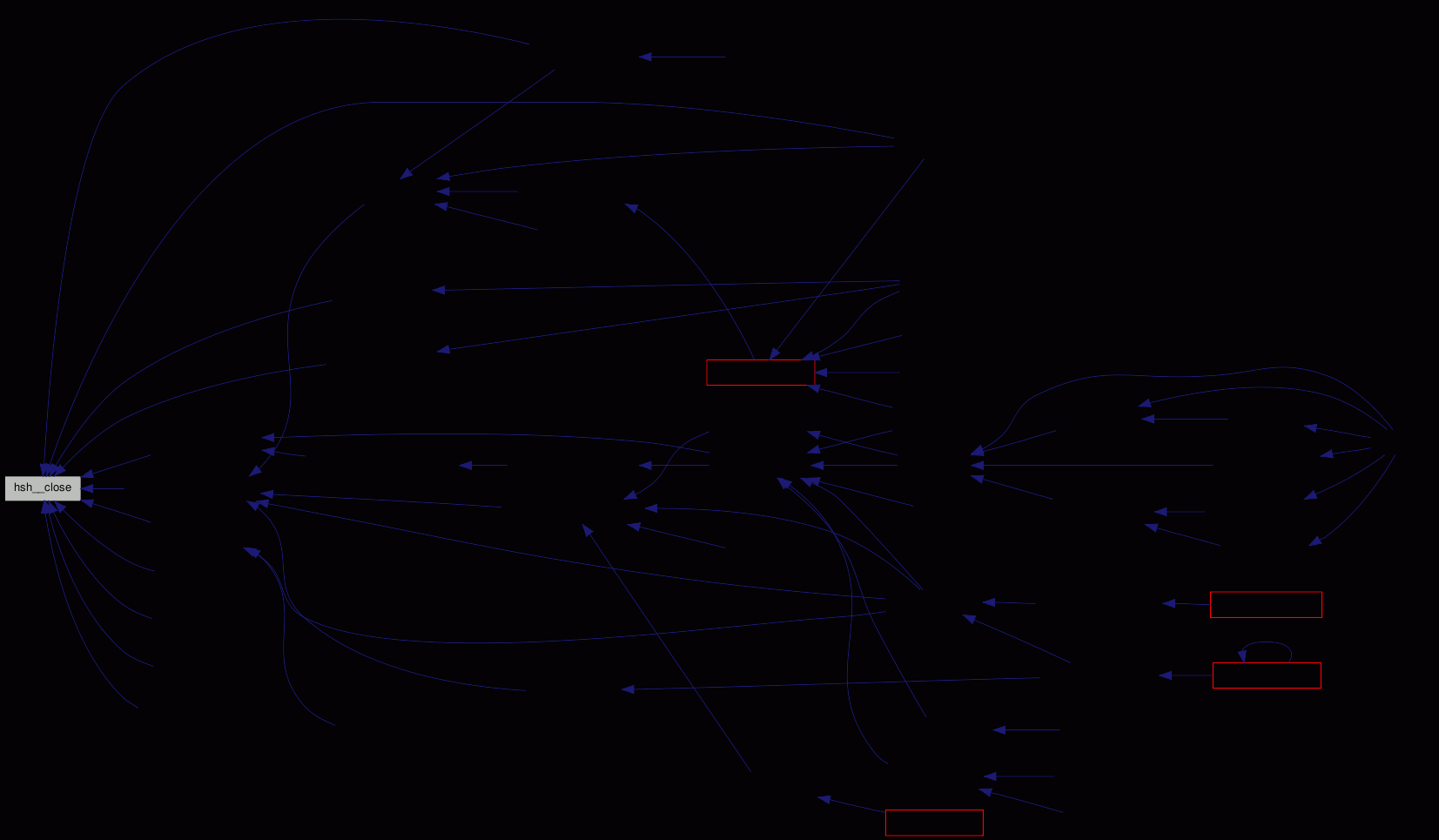
| int hsh__collect_garbage | ( | hash_t | db, | |
| int * | did_remove | |||
| ) |
Collect garbage in the hash table.
Collect garbage in the hash table.
The previously marked keys in the hash table are removed; it is not checked for empty-ness nor reorganized.
Definition at line 287 of file hash_ops.c.
References hash_s::db, DEBUGP, STOPIF_CODE_ERR, and hash_s::to_delete.
Referenced by hsh__close().
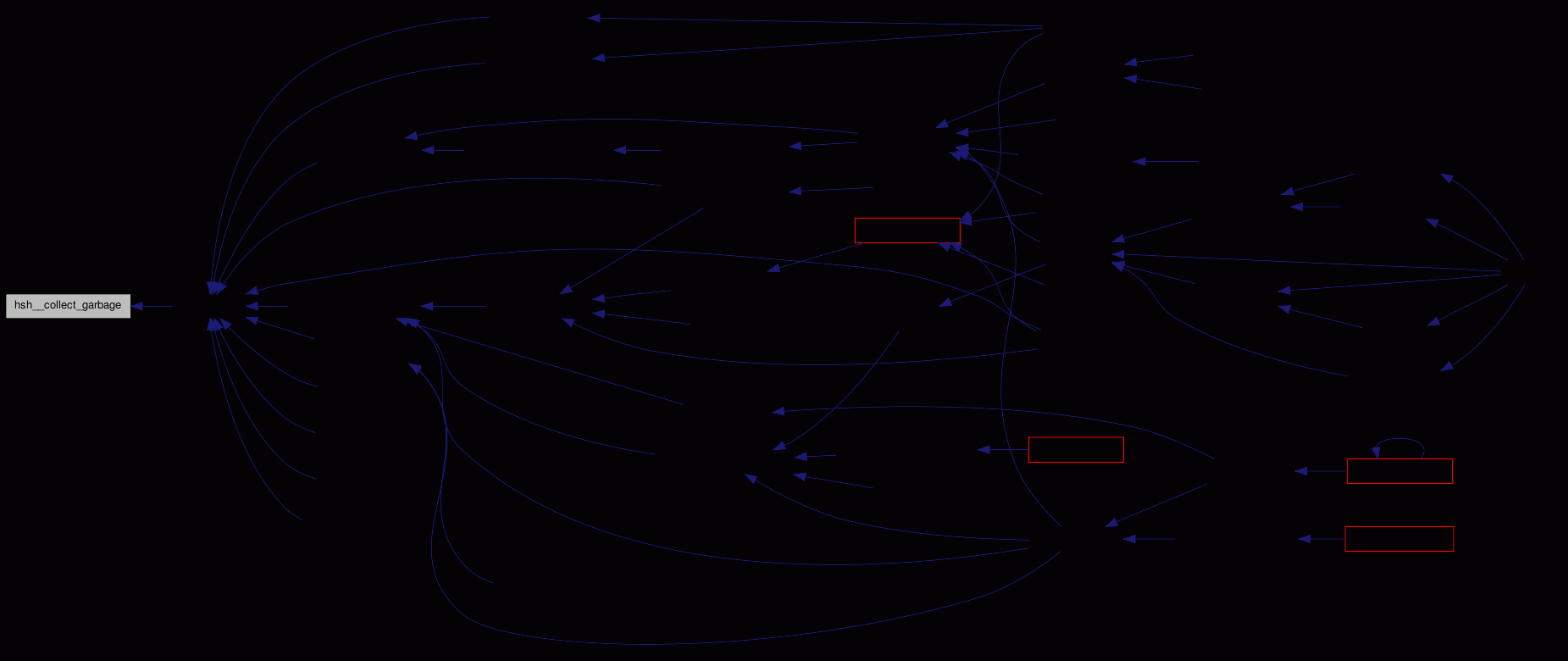
| int hsh__fetch | ( | hash_t | db, | |
| datum | key, | |||
| datum * | value | |||
| ) |
Read value associated with some key in db.
Memory of datum::dptr is malloc()ed.
Definition at line 378 of file hash_ops.c.
References hash_s::db, and IF_FREE.
Referenced by cm___dump_list(), cm___get_base_source(), hsh__insert_pointer(), hsh__list_get(), and prp__fetch().
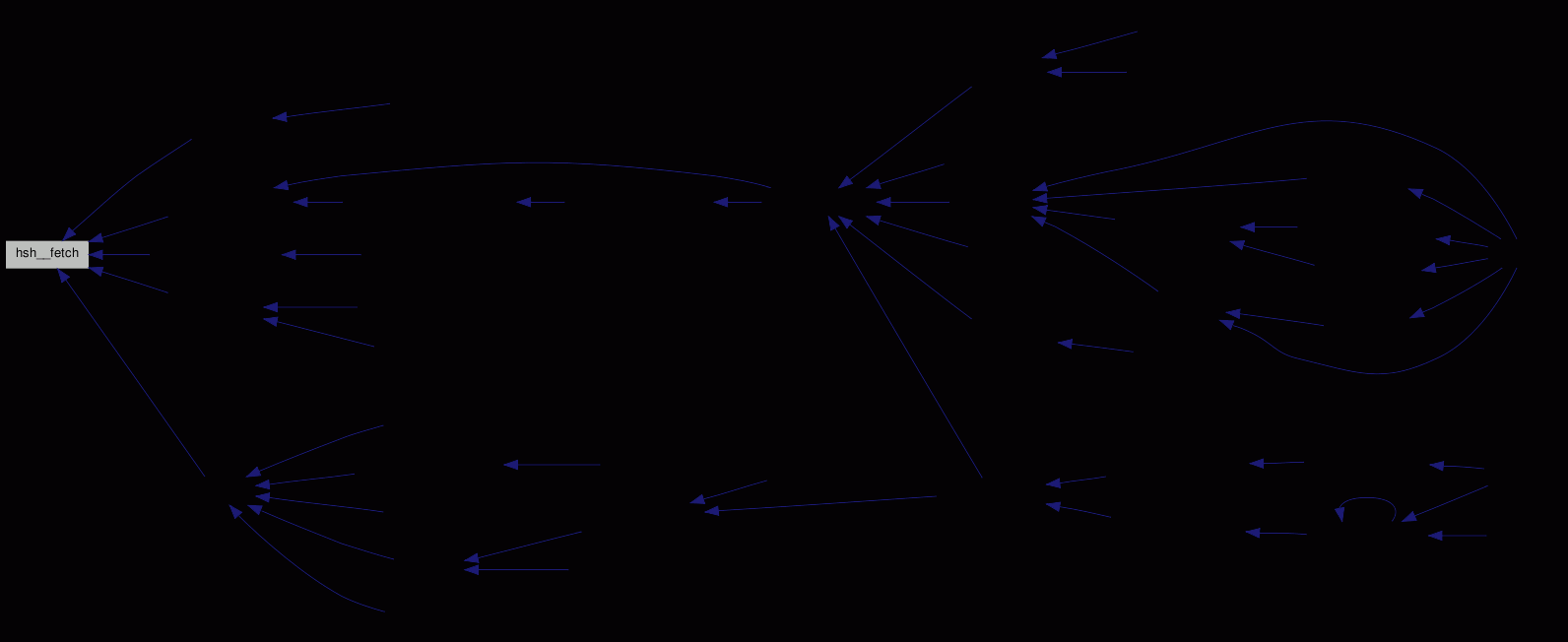
| int hsh__first | ( | hash_t | db, | |
| datum * | key | |||
| ) |
Find first key.
Definition at line 394 of file hash_ops.c.
References hash_s::db.
Referenced by cm___dump_list(), hsh__close(), and prp__first().
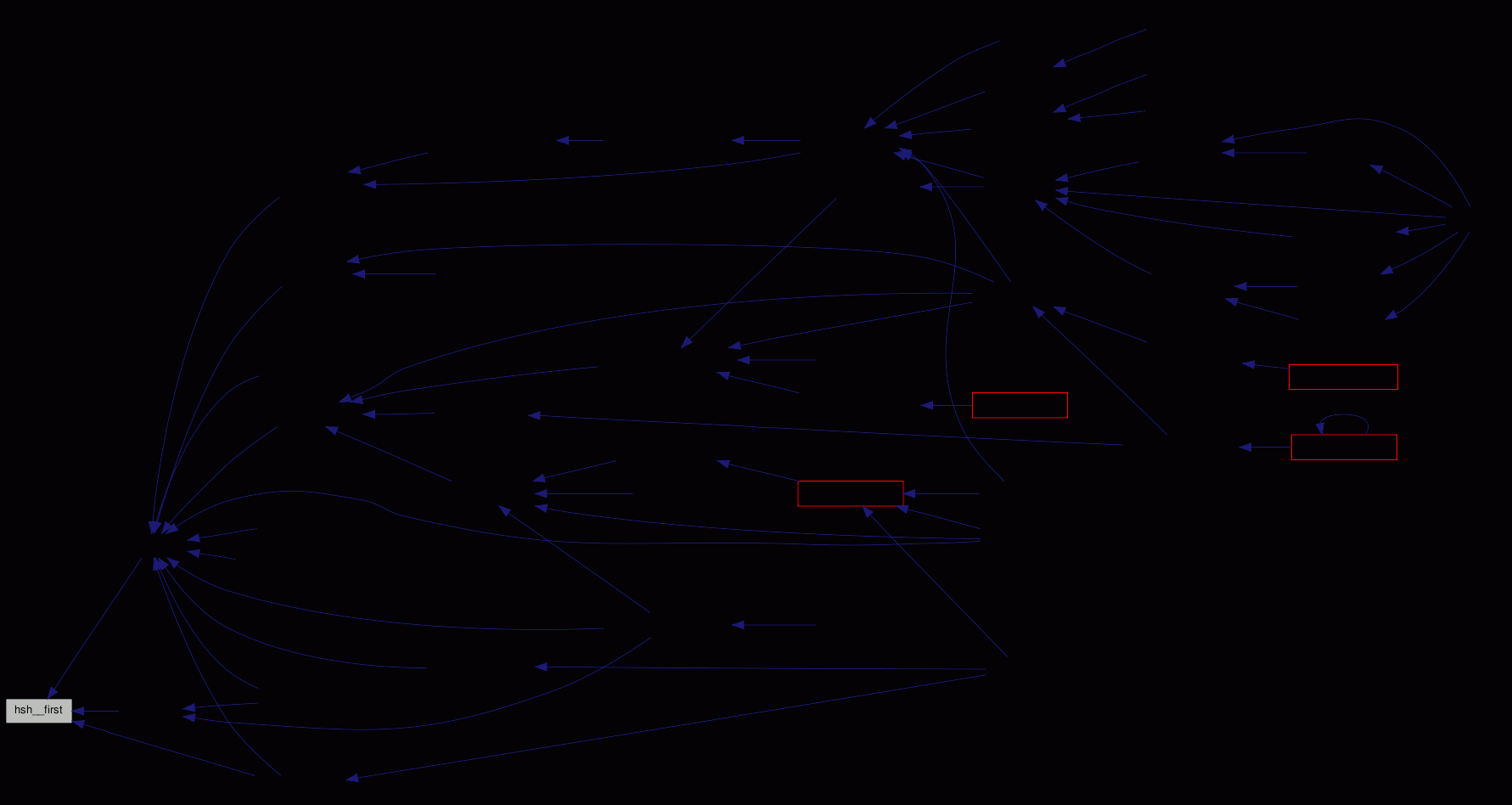
| int hsh__insert_pointer | ( | hash_t | hash, | |
| datum | key, | |||
| void * | value | |||
| ) |
For short-time storage (single program run): Insert the pointer value into the hash at key.
Definition at line 494 of file hash_ops.c.
References BUG_ON, hsh___list::count, hsh___list::entries, HASH__LIST_MAX, hsh__fetch(), hsh__store(), and STOPIF.
Referenced by cm___hash_register().


| int hsh__list_get | ( | hash_t | hash, | |
| datum | current_key, | |||
| datum * | next_key, | |||
| struct estat ** | arr[], | |||
| int * | found | |||
| ) |
Get an list of found entries from hash addressed by current_key into the (statically allocated) arr.
Get an list of found entries from hash addressed by current_key into the (statically allocated) arr.
If next_key is not NULL, it is set so that the next query can use this key for the next element. If *next_key==NULL, no next element is there; everything has been returned. If no (more) entry could be found, ENOENT is returned, and *found==0.
In case of storage via an array hsh__list must store some internal state; therefore only a single loop is (currently) possible.
Definition at line 563 of file hash_ops.c.
References BUG_ON, hsh___list::count, hsh___list::entries, HASH__LIST_MAX, hsh__fetch(), and STOPIF.
Referenced by cm___hash_list(), and cm___match_children().


| int hsh__new | ( | char * | wcfile, | |
| char * | name, | |||
| int | gdbm_mode, | |||
| hash_t * | output | |||
| ) |
Create a new hash for wcfile with the given name.
Create a new hash for wcfile with the given name.
If flags is GDBM_NEWDB, the file gets deleted immediately; there's no need to keep it around any longer, and it's not defined where it gets located. If another open mode is used, the entry is always created in the WAA or CONF base directory for wcfile, ie. the hashed path for the working copy root.
Definition at line 258 of file hash_ops.c.
References hash_s::db, hash_s::filename, HASH_REMEMBER_FILENAME, hlp__calloc(), hsh___new_bare(), IF_FREE, and STOPIF.
Referenced by cm___dump_list(), cm___get_base_source(), cm___make_copy(), cm__detect(), and prp__open_byname().

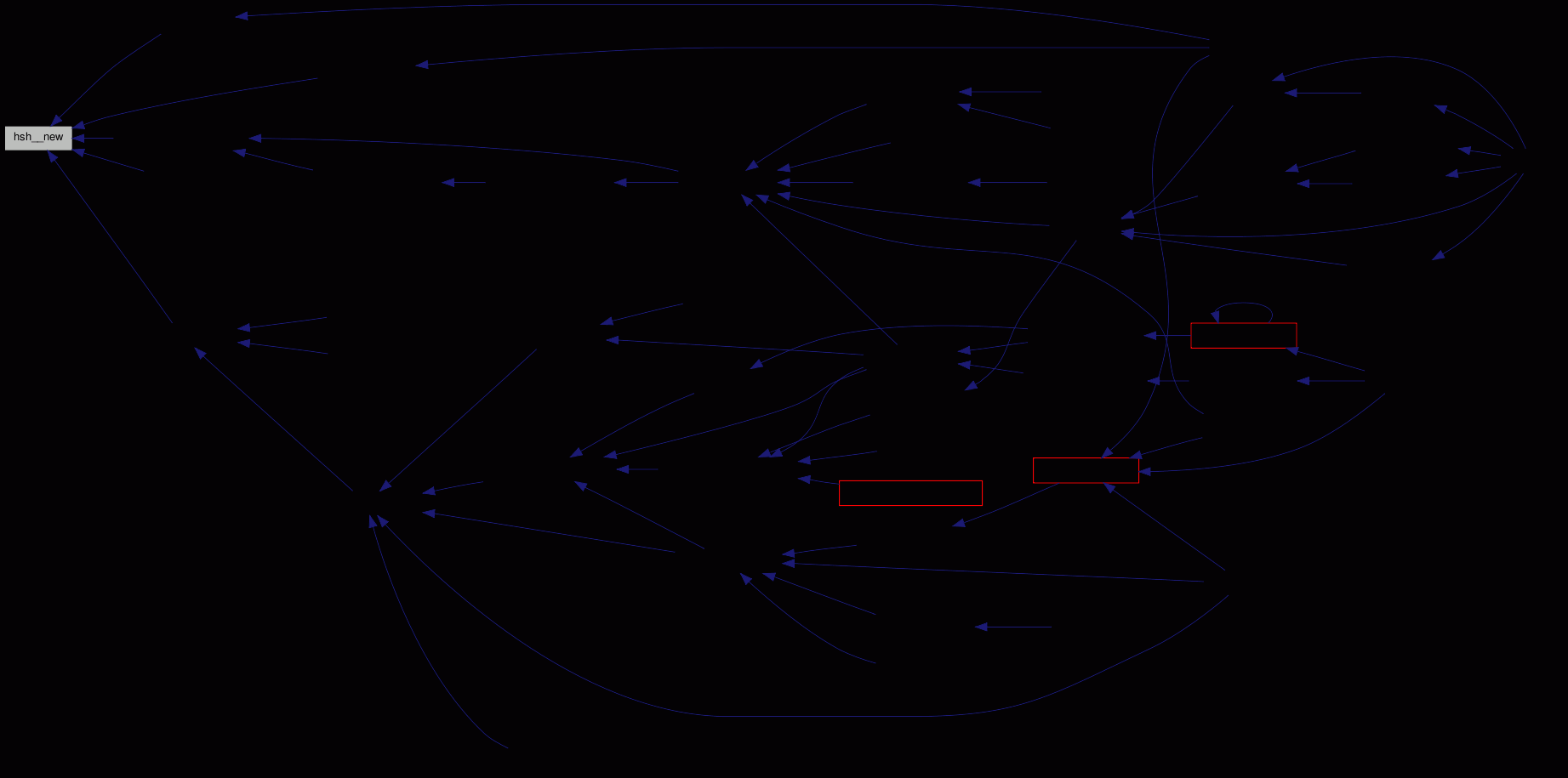
| int hsh__next | ( | hash_t | db, | |
| datum * | key, | |||
| const datum * | oldkey | |||
| ) |
Find next key.
Find next key.
If oldkey==key the ->dptr is free()d; else the caller has to do that.
Definition at line 410 of file hash_ops.c.
References hash_s::db, and IF_FREE.
Referenced by cm___dump_list(), and prp__next().

| int hsh__register_delete | ( | hash_t | db, | |
| datum | key | |||
| ) |
Registers some key for deletion on database close.
Definition at line 609 of file hash_ops.c.
References DEBUGP, HASH_TEMPORARY, hsh___new_bare(), STOPIF, STOPIF_CODE_ERR, and hash_s::to_delete.
Referenced by ci___send_user_props(), and cm___get_base_source().


| int hsh__store | ( | hash_t | db, | |
| datum | key, | |||
| datum | value | |||
| ) |
Store some value in the hash table.
Definition at line 432 of file hash_ops.c.
References hash_s::db, and STOPIF_CODE_ERR.
Referenced by hsh__insert_pointer(), hsh__store_charp(), and prp__store().
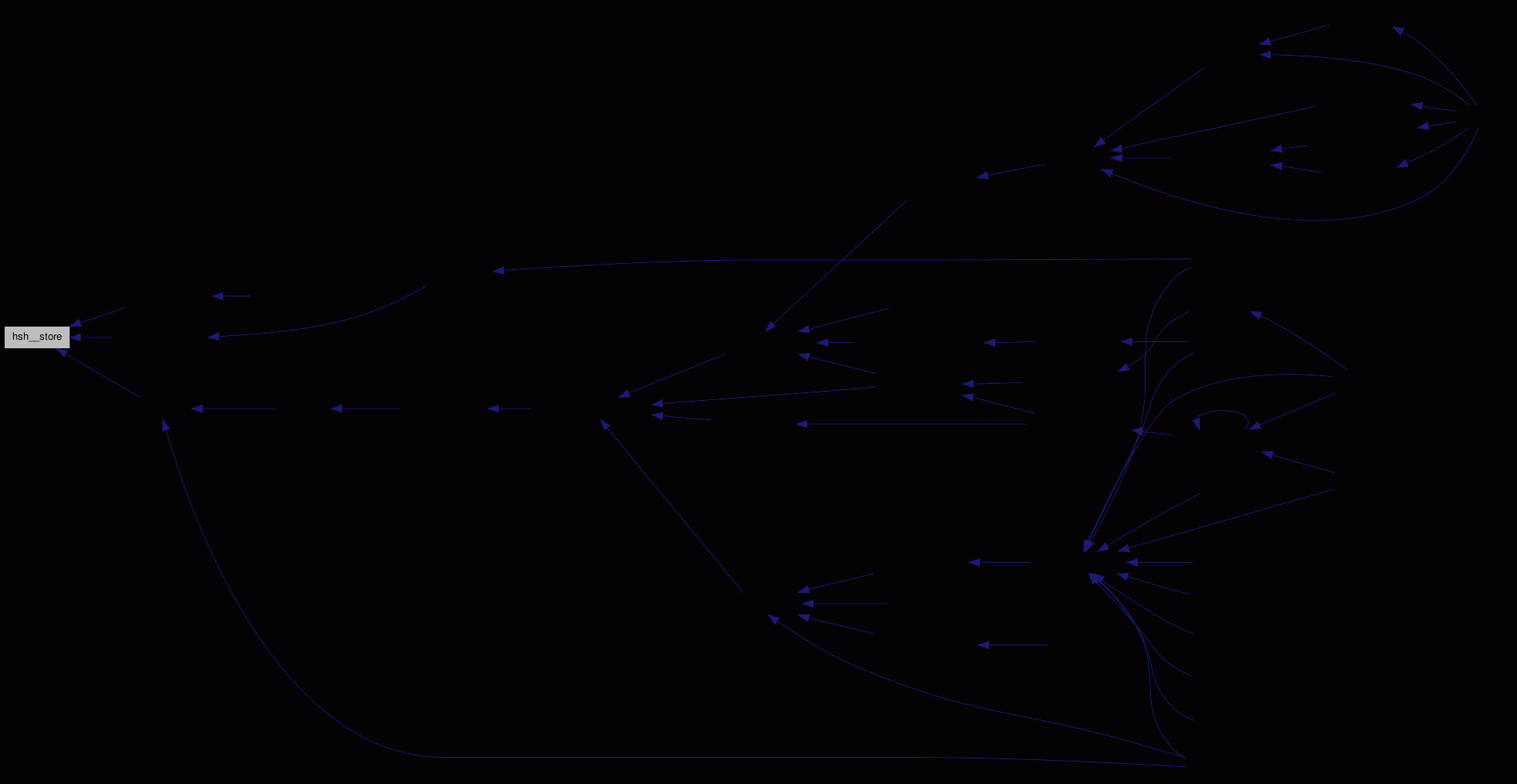
| int hsh__store_charp | ( | hash_t | db, | |
| char * | keyp, | |||
| char * | valuep | |||
| ) |
Store character strings in the hash table.
Simple hash operations.
These are just wrappers, and are incompatible to the other hash functions - they don't store any links to other elements.
Store character strings in the hash table.
The delimiting \0 is stored, too.
Definition at line 451 of file hash_ops.c.
References hsh__store().
Referenced by cm___make_copy().


 1.6.1
1.6.1